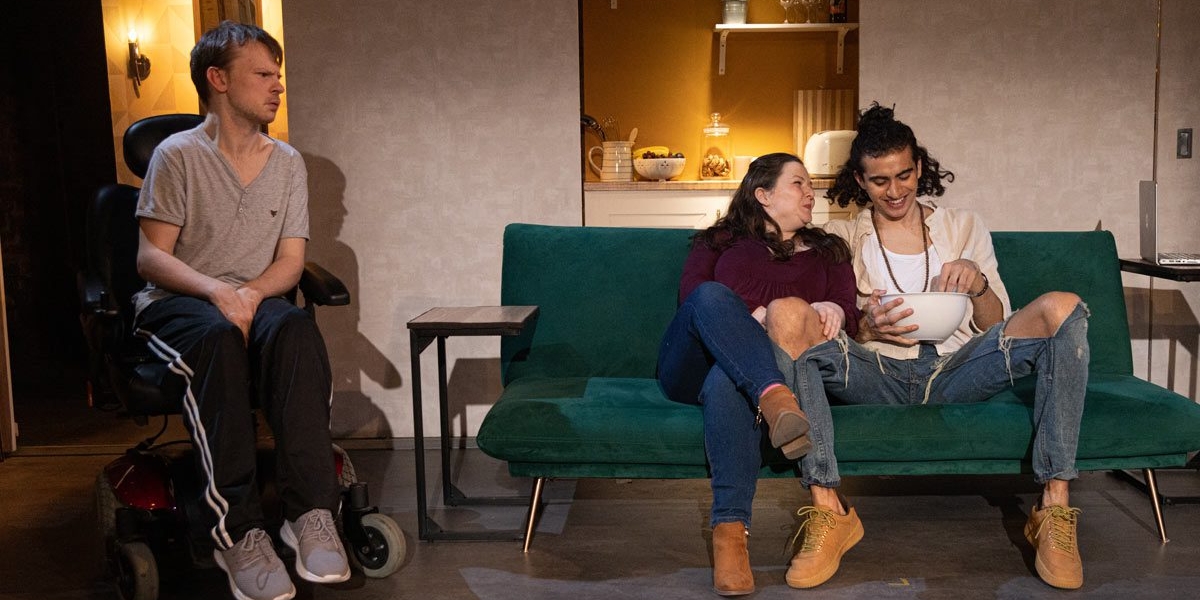‘Animal’ opens at Park200 after an initial run in Manchester and winning the inaugural Through the Mill Playwriting Prize. It deserves to win many more. For anyone interested in issue-driven theatre that is nevertheless humorous and poignant and driven by rich characterisation it really is a must-see.
Jon Bradfield, perhaps best known for his adult pantos at ‘Above the Stag’, here develops and dramatises the life and experiences of Josh Hepple, activist and theatre reviewer. David, the central character in the play, has cerebral palsy, which brings with it a speech impediment and uncontrollable bodily movements. He manoeuvres an electric wheelchair and can type on a mobile phone. But he needs a rota of live-in helpers to maintain him in his apartment.
This is not simply or mainly a play about the challenges of disability. More specifically it fuses this starting point with a focus on disability and sexual needs. David is a gay man reliant on others in this respect too, and once he is introduced to Grindr there is no stopping him. Mobile phone exchanges are displayed on screens and we get to share all his frustrations, fulfilments and rejections as various potential partners flit in and out of the action. Some of the exchanges are very painful in the predictable crudity of reaction and lack of empathy and understanding they reveal; whereas the scenes of sexual encounter are both tender, credible, awkward and funny, a tribute to the quality of the writing in an area where control of tone is so perilous.
Another aspect where this play scores highly is in its depiction of David’s relationships with his carers. There are three – Jill, Derek and Mani, all highly contrasted – the deeply caring but sometimes smothering mother figure, the actor on a tight budget who quietly absorbs his employer’s frustrations, and the flamboyant gay friend who tries to give David a sense of life beyond his apartment. There is nothing overly saccharine here – none of these characters is perfect and David’s less attractive aspects are not concealed, whether in exploiting their good nature or in misusing his power as their employer, and the play is richer and more real for it.
As David, Christopher John-Slater’s performance is commanding and expertly calibrated. It does take a while, at least for this reviewer, to become attuned to his vocal delivery, but this is a wholly credible, multi-layered presentation of a character seeking love and connection, with a fierce intelligence and very dry take on the world. Matt Ayleigh, Amy Loughton, Harry Singh do excellent work in the roles of the carers and friends, doubling up in other roles too. William Oxborrow provides a fine set of cameos of older men, whether David’s father, struggling to come to terms with the sexual dimensions of his son’s life, or as a sequence of older men from Grindr responding to David’s profile. Joshua Libard plays Liam, the sustained love-interest in David’s life, who has problems of his with both mental health and commitments. This is another fine-grained performance that explores the full dimensions of this rounded, rewarding script.
Gregor Donnelly’s set operates on two levels, with the living room and kitchen of the apartment below and a walkway above. Scene changes between bedroom and living area are deftly and swiftly done without interrupting the flow through the many short scenes in the two acts. There is an equally neat transition into a patio dinner party for the final scene.
Realism, wry humour, and an exquisite sensitivity to nuance are what you take away ultimately here – the play and its performers do not shy away from uncomfortable observations that are too often tidied away in the representation of people with impairments. It is timely that the fact that disabled people are also sexual people is made central and natural rather than awkward; and we are also made to think hard about the difficult fact that coping with disability often requires manipulative tactics in order to get help and cooperation even from those who are already well disposed. The daily toll, whether psychological or physical, of negotiating what most of us take for granted is laid bare but never in a preachy way.
The first half is perhaps a little long with a few too many fleeting Grindr profiles coming into view with no additional dramatic benefit; but otherwise this is an expertly crafted and impeccably executed drama on important and too often neglected themes. The Park Theatre should be applauded for showcasing it, and hopefully the play will return again soon for a second outing, whether in Finsbury Park, or elsewhere – it deserves to be seen by as many as can.

